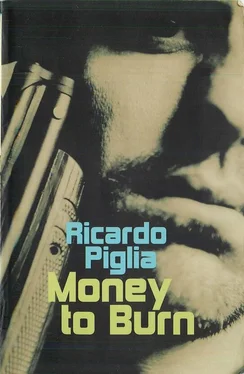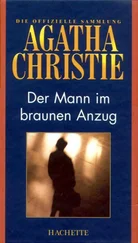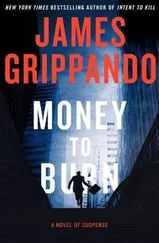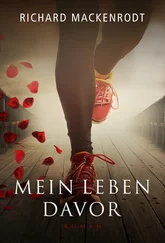That was the first dead man in an endless series (or so said the Gaucho, according to Bunge). That was when the epoch of disgrace began and the Gaucho went from being a pickpocket, a loser, to being an assassin. They took him off to Sierra Chica and put him on bread and water, locking him up until he confessed to what everyone knew. He had clear memories of that period which he recounted to Dr Bunge, who noted every last one of them in his little white notebook.
'If you carry on like this, you'll end up badly, Dorda,' the doctor told him.
'I am already a bad lot,' said the Blond Gaucho, with difficulty in expressing himself. 'I've been on the wrong track since I was a child. I'm a hopeless case. I don't know how to express myself, Doctor.'
He waved his hands about to convey what he really felt, but they laughed in his face. He became enraged. 'You'll end up badly,' his late mother went on and on saying to him.
And he'd ended up here. In this flat beside his dead brother, behind a machine-gun aimed at the street, and the street crammed with marksmen out to kill him.
'They'll stake me out, and then they'll send me back to Sierra Chica again, along with the Chileans.' They were horrific, the Chileans, they treated him like a beast. 'I'm not going back there. No way will they get me back to Sierra Chica.'
He leaned out of the window, beside the Kid stretched out on the floor of the flat, the medal clasped in his fingers, and the Gaucho could feel him there, dead at his feet, the only man who had ever loved him, and who'd treated him as a person, better than a brother, that Kid Brignone had treated him like a woman, understanding whatever it was he couldn't bring himself to say and so always saying, he the Kid himself, whatever it was the Gaucho felt without being able to express it, as if reading his thoughts. But now he was there, he could see him stretched out with his clear expression, the Kid, covered in blood, face upwards, dead.
He leaned out of the window and looked down on to the street. Downstairs, there was an unusual degree of quiet. He could hear the secret police moving about over his head, as if they were dragging or manoeuvring corrugated iron across the roof.
'Come and get me, bastards,' he yelled. 'I've still got two boxes of bullets.'
He could yell it and could think, without saying as much, 'I've a load of drugs, a wrap of cocaine, enough to stay awake, I've been up that many hours.' Morning had come and then noon, and they were still unable to dislodge them from inside. He stuck his nose into the packet and inhaled, feeling as if it were liberating him, filling his throat like fresh air, a limpid freshness that cleared his head and made him think that he was going to manage to get out of there, to save himself.
He was going to be gone, taking out all the cops he could along with him, they'd sworn as much to one another without actually mentioning it, the Kid Brignone and the Blond Gaucho. On one side of the doorframe they'd made notches with a penknife, there at the entrance, of each cop they'd brought down. There'd been so many it was an effort to remember, around ten or twelve of them. If he'd had a bomb, if he'd had dynamite, he could have tied it to his belt and hurled himself at the street, where all the cops were waiting to watch him die. That way he could be blown to pieces with the lot of them.
Even the crack police were unused to being confronted by men who stood up to them and didn't back down. What they were used to, that useless lot, was to play torturer or hangman, tie you down with bedsprings, shock you until you explode. But when they found someone who stood his ground, who refused to lose his head, they wasted hours in failing to summon up the courage to go and get him.
'Come up and get me, Fatso Silva, you stuck pig.'
To the Gaucho, it was as if his voice came out unwavering, and the entire city listened with rapt attention, his voice resounding like the voice of God from on high, the voice of the Holiest in the Heights, right across the capital. 'Holy Mary Mother of God pray for us sinners now and in the hour of our death Amen.' He recited the prayer on a single exhalation, he recalled every word of the prayer Sister Carmen had taught him. In an orphanage run by nuns who taught him how to pray and sometimes the Gaucho would pray in order to eradicate the voices and he always recited the same prayer to Our Lady the Mother of God.
'Bring me a priest,' he commanded. 'I am going to make my confession.'
They had entered the paved courtyard on horseback and the woman went outside to request they show some respect, with a double-barrelled shotgun under her arm. Where did this memory materialize from?
'I have the right to request a priest. I am a baptized Catholic.'
Shots and some distant voices could be heard from outside.
Now he was calm he knew full well that special branch were there, crawling over the neighbouring apartments. He kept remembering the woman with the shotgun — could it have been his mother? — but then he couldn't remember anything any more, he blanked out, everything vanished into a vacuum, into nothingness. It was the same with his life. The years before the orphanage he could recall perfectly well, thereafter everything was erased, until he met up with the Kid. The days flew by him, and the months never ended. Prison makes the days go by more slowly and the years more quickly. Who said that? From when he came out of prison, he remembered nothing more right up until today, sitting on the floor beside the window, waiting for them to come and kill him.
The Gaucho Dorda had no more voice left to pray. Poor fellow, he was going to die in the Eastern Republic of Uruguay. He had travelled a great deal, his father, who owned a fleet of carts and used them to go harvesting every year, to make money.
A light wind blew in through the inner windows, moving the burnt curtains like ghostly spectres. The Kid's body lay full length on one side of the room, beside the window giving on to the patio. And he could see his father, all of a sudden, who arrived every evening on his skewbald horse.
'What do you have to say, partner…'
The horses rapidly became accustomed to the engines of the harvesters, when they came to clear the plantations with the weeds at their height, and they'd rev the accelerator on the regulator, and the horses would pause and, when the problem was dealt with, they'd proceed again. Now images were forming clearly in his mind, of a harvest up in Tandil when he was ten or eleven years old. The speed at which they sewed up the sacks: when the score went up to thirty a hectare, he had to prepare two or three a cart, and in his haste he sewed his shirt tail into one of the sacks. The silk thread in the mouth of the sack needed stitching into a cross, a real cross. He could never learn how to properly sew up the mouths of those sacks. He was semi-retarded, they said, but it wasn't true, he just found it difficult to talk normally, because he was always kept busy arguing with those women muttering things inside his ear. Sewing the words, stitching them to his body, with greasy thread, a tattoo worn on the inside, the words of his dead mother engraved in him as if on a tree trunk.
'They're like flashes of lightning, like thunderclaps, like a white light, memories are,' Dorda announced. 'Here I am, and here I'll stay.'
Everything about him was destroyed, the walls were stripped and broken, bare of plaster, their timbers exposed; a phenomenal quantity of spent lead was scattered through the bedrooms and living-room, the bathroom and the kitchen showed the full force of the fire that had raged there for several hours. What was left at his feet could no longer be recognized as a suite of furniture.
'Come and get me out of here, Silva's merry men, Silva the shit, the pig, let the night reel you in…'
Читать дальше












